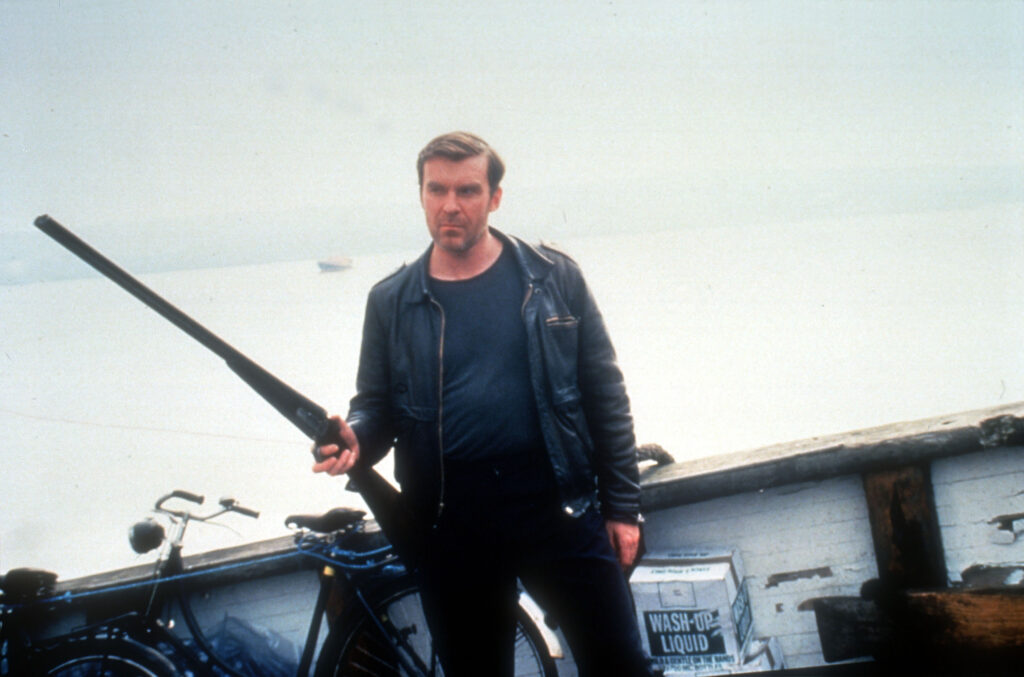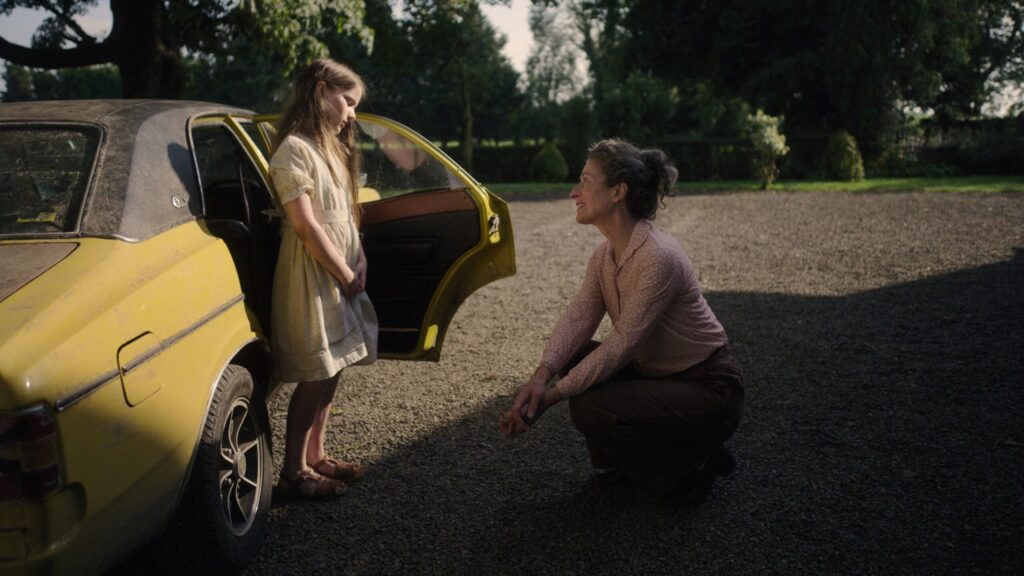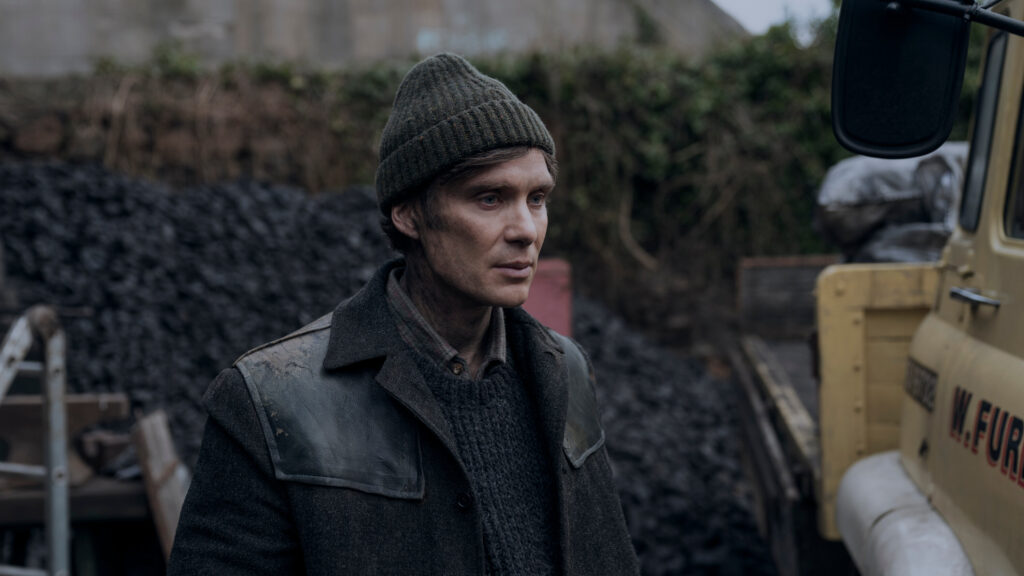An Cailín Ciuín (2022), That They May Face the Rising Sun (2023) and Small Things Like These (2024)
By Seán Patrick Donlan

Whatever else life brought in the early 1980s, there were a number of new and ongoing challenges for the Irish state and society. There appeared no end to widespread unemployment and mass emigration. Political instability was significant, with multiple governments between 1979 and 1982. A heroin epidemic shook Dublin. Political killings and hunger strikes rocked the North. And the church remained central to Irish mores. Contraception was limited, and divorce and abortion were illegal.
Many films from, or set in, the period touch on these events. These included, for example, several by Joe Comerford. Down the Corner (1977), coupled with the music of Liam Weldon, looked at the broken promises of the Republic. Traveller (1981), with a screenplay by Neil Jordan, painted a dark picture of violence begetting violence through the sexual sins of a father. And Reefer and the Model (1988) centred on a family of choice very different from that defended by the contemporary church and state.
Indeed, Reefer and the Model and Cathal Black’s Pigs (1984) foreground individuals often marginalised in the period. Other, more recent films, for big and small screens, have engaged with national tragedies around family. Ann (2022) concerns the death of Ann Lovett in 1984 and contemporary social mores around unwed mothers. And Out of Innocence (2019), about the Kerry Babies case the same year, casts a cold eye on state and society. Additional coming-of-age stories, each produced later, are also set in the period: Dannyboy (2020), Sing Street (2016) and, most notably, Margo Harkin’s Rock-a-Bye Baby (1990).
A few films in the early eighties dealt with urban social issues, particularly One Day Time (1982) and Sometime City (1985); Spilt Milk (2024) will wrestle with them on its 2026 release. Other films, more or less fictional, focus on Northern sectarianism and violence. This includes Jordan’s debut, Angel (1982), in which we can already glimpse the mature director’s style and substance. Mike Leigh’s Four Days in July (1984) followed two couples—one unionist, one nationalist—with even-handed understanding. There are, of course, many others, including Maze (2017), Some Mother’s Son (1996) and, most notably, Hunger (2008).
More recently, An Cailín Ciuín (The Quiet Girl, 2022), That They May Face the Rising Sun (2023) and Small Things Like These (2024) have been set in the early eighties, each outside of the metropolis and adapted from literary sources. That They May Face the Rising Sun was adapted by Pat Collins and Éamon Little from the late John McGahern’s final novel (2003). An Cailín Ciuín and Small Things Like These are both based on the work of Claire Keegan: the former adapted from Foster (2009) by Colm Bairéad, the latter (2021) by Enda Walsh. The films, their source texts and audience responses represent a range of different views on the period.
AN CAILÍN CIUÍN
Keegan’s long short story was simple enough. In 1981, in County Wexford, a nameless girl is briefly cared for by distant relatives. Through John and Eibhlín Kinsella’s love and attention, she returns a changed person. Keegan was herself born in 1968, but the story isn’t a memory piece. Instead, it’s a meditation on home and neglect that may say as much about the period in which it was written, the year after the Great Recession of 2008, as about its setting. Few details about our heroine’s family are noted, most current events merely hinted at. The church is almost absent. This agnosticism towards the past may be part of the story’s appeal. And while its girleen is withdrawn, she isn’t quiet. In print, the story is told entirely from her perspective.
An Cailín Ciuín was no less successful than its source. Bairéad’s delicate direction, Kate McCullough’s stunning cinematography and a strong domestic cast produced a film that might be the best Irish film ever made. The director, born in 1981, had previously focused on documentaries and shorts. In adapting Keegan’s text for his feature debut he made significant changes. Most obvious was the decision to translate it into Irish, a choice both financial, given funding sources, and personal. Bairéad noted that it was an opportunity to revisit the past and to pay a debt to his father. Despite being raised in Dublin, the director’s father had only spoken to him in Irish, a situation that appears very close to Bairéad’s 2005 short Mac an Athar (His Father’s Son).
The director also made other significant alterations to Foster. Many of these provide additional background information, with those additions, nearly all inserted at the film’s beginning, making up almost a sixth of its running time. His changes suggest a critique beyond Keegan’s text, though still relatively modest. In addition to naming the girl Cáit, Bairéad pictures her mother cowed and overwhelmed by domestic responsibilities, her sisters sexually ignorant. Unlike the original, this quiet girl isn’t just dishevelled but also underfed and prone to flight. Most dramatically, Dan, her father, is actively unkind to her and others, including barely concealed adultery.
While Dan in Foster may be guilty of emotional distance, of which he’s presumably no less a victim, this is no small thing, not least as he’s the only character whose primary language is English. The translation of the text also creates a new layer of explicit communication issues. In Bairéad’s telling, Cáit’s journey to the Kinsellas is much more dramatic than in the original story. That longer journey, presumably to reach the Gaeltacht, suggests a critical, little-noted, significance. For the director, it may be an epic shift from trauma to therapy, from brutish Anglophone townland to a pastoral Irish-speaking oasis in which Cáit will find herself. If this isn’t, strictly speaking, nostalgic about the past, it might suggest to audiences an alternative present.
THAT THEY MAY FACE THE RISING SUN

Ireland’s best contemporary directors—Bairéad, Frank Berry and Pat Collins—have each produced important documentary films. Collins, in particular, has directed more than a dozen documentaries since 1999. In between these, he’s directed two narrative/documentary hybrids. Silence (2012) and Song of Granite (2017) are already ranked among the finest Irish films ever made. That They May Face the Rising Sun, co-written by Collins and Éamon Little, was the former’s first narrative film. It was eagerly awaited.
Both in print and on the screen, That They May Face the Rising Sun is difficult to place in time; in the film especially, phones and televisions are almost absent. Despite some complicating details and inconsistencies, the story appears to be set at the cusp of the eighties, around the same time as Foster/An Cailín Ciuín. In contrast to Keegan, and writing at the height of the Celtic Tiger, Collins seems to lovingly frame a hallowed rural community in transition, with an incarnational sense of the commonplace, told through a sacramental structure over the course of a year.
In both novel and film, Joe Ruttledge, our main character, notes how the rafters of a long-delayed greenhouse frame the sky, making it ‘more interesting than the open sky, more human’. As framed by writer and director, neither the Irish language nor children have much of a presence in this fictional Fenagh. Indeed, its religion and traditions, including regular visits of neighbours, are already significantly hollowed out, not least by emigration. Central to the novel is a nuanced exploration of ‘visiting and belonging’, an engagement with a modernity, and the demands of a market economy, that emphasise individual mobility.
Like the text, the film, in a manner most associated with slow cinema, largely lacks a conventional narrative, but it succeeds despite, or perhaps even because of, Collins’s changes. Notwithstanding its loose structure and languid movement, its rural rhythms and Richard Kendrick’s lush imagery, the film may sharpen McGahern’s themes. Still, Irish readers will know that the novel must be contextualised in the author’s earlier, semi-autobiographical work, critical of the parental and clerical abuse of an earlier generation and banned by the state. Unburdened by this ballast, Collins’s elegy is necessarily more nostalgic and sentimental.

The film’s quiet people, if a little rough, are uniformly decent. The elimination of John Quinn, the novel’s most unpleasant character, is significant. Joe’s vocation is altered, too. He’s now explicitly a writer. This isn’t radical: Joe was always a stand-in of sorts for McGahern, but the director’s change also allows the use of the book’s text as voice-over for the film. And Joe, despite being a native of the area, and his wife Kate—American in the novel, a German actress in the film—remain liminal figures. But these blow-ins, immigrants moving into Fenagh ‘against the tide’, are positive forces who seek to preserve the customs of the community and act to mediate the local and global, past and present.
For all of its prose-tinted passion, the film, like the book, has an unmistakable funereal feel. From 50 years on, its people are buried in their stony grey soil, the bones on which today’s Ireland, an age more ‘alphabetical’ and arguably less rooted, is built. Cinema audiences are left to decide whether to lament this loss or to determine whether something of this past might be worth retaining for the future.
SMALL THINGS LIKE THESE

Ultimately, Foster/An Cailín Ciuín and That They May Face the Rising Sun were successful because each was so well crafted. Their complexity and vagueness with respect to historical detail also allowed some flexibility, between artists and audience, in their interpretation of the early eighties. Small Things Like These, both in print and on the screen, is far blunter. The story is set around Christmas 1985 in New Ross but was published in 2021, a decade after Foster. While it retains the subtlety of Keegan’s other writing, it’s unusually explicitly dedicated to victims of institutional abuse, even citing the 1916 Proclamation’s pledge to ‘cherish all of the children of the nation equally’. Coal and timber merchant Bill Furlong discovers a young woman in a mother-and-baby home and confronts the social cost of action and the moral cost of inaction. As some have noted, Keegan’s portrait of the period, obviously fictional, may not entirely square with fact. And Furlong’s ultimate decision is too easily explained by his specific past: he’s the child of an unwed mother and the ward of a Protestant family. The result is that wider social inertia can be too easily explained away or absolved.
Small Things Like These follows several films, each a generation ago, that focused on institutional abuse. The Magdalene Sisters (2002), Sinners (2002) and Song for a Raggy Boy (2003) elicited, and elicit, complex responses. For some, they are bracing self-examination; for others, exaggerated ‘misery porn’. Small Things Like These encountered a similar response. This isn’t surprising, despite the film’s aesthetic and acting virtues. Belgian director Tim Mielants and screenwriter Enda Walsh are accomplished artists. Walsh is particularly well known for his stage work and screen adaptations of his Disco Pigs (2001) and Hunger (2008). But audience responses to their film adaptation have been coloured by their perspectives on its setting.
Most notably, Cillian Murphy, producer and the film’s lead, claimed that the early eighties were ‘like the f**king dark ages compared to now’. In fact, Mielants and Walsh double down on the darkness, consciously choosing limited narrative and colour palettes that make the film’s setting indistinct and drain it of nuance. The film struggles with the non-liner exposition of the original story and, without the complex interiority provided by Keegan, Furlong is considerably less rounded. Despite Murphy’s considerable abilities, his Furlong merely broods, all stage stares and audible sighs, under the film’s 40 shades of grey.
Between its clumsy flashbacks and dark nights of the soul, Furlong washes his hands with sacramental solemnity. In the end, real historical trauma is undermined by turgid drama, the indictment of abuse cheapened by caricature. In fairness to Mielants and Walsh, Keegan’s text lends itself to this interpretation. Her talent for minimalism and the blunt extratextual guides to interpretation tacked onto the story suggest that Furlong’s actions are an isolated, quixotic attack on obvious clerical evil. With no little irony, this is its own kind of handwashing, absolving the wider state and society—people, politicians and the fathers of so many children—of any guilt for the institutionalisation of so many women.
An Cailín Ciuín, That They May Face the Rising Sun and Small Things Like These, with their sources, present significantly different pictures of the early eighties in Ireland. These needn’t be mutually exclusive. The vices and virtues of the past can obviously coexist. And our efforts to understand our history, both as fact and fiction, are essential to our all-too-human framing of the world around us. Each of these films suggests something of their settings but may tell us as much about the time they were written and filmed. Each suggests something about us, now.
Seán Patrick Donlan is a Professor of Law at Thompson Rivers University.
Further reading
C. Bairéad, ‘Quiet reflections: Colm Bairéad on The Quiet Girl’, Curzon (11 January 2023) (curzon.com).
R. Flynn, ‘An Cailín Ciuín’, Estudios Irlandeses 18 (2023), 330–70 (https://doi.org/110.24162/EI2023-11720).
H. Linehan, ‘Cillian Murphy’s Small Things Like These has become a cause célèbre of the Make Ireland Great Again’, Irish Times, 9 November 2024.
N. McKay, ‘Attention is a form of love’, Film Ireland, 31 May 2024.
